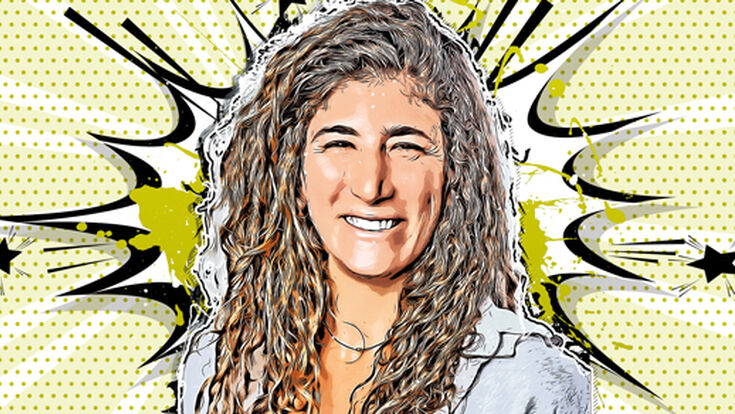Woman in Waste Management : “My motivation is not money but environmental justice”

Born in Brazil, Rafaela Craizer has always been drawn to faraway places. “Not necessarily to get away, but to see the world,” she says. This is an urge that is actually quite unusual in her country of birth. “Here, most people stay at home with their parents for a long time.”
Craizer studied environmental engineering in Brazil and Australia and obtained her master’s degree from the University of Darmstadt in Germany in 2013.
While she was working on a project for the Deutsche Gesellschaft für Internationale Zusammenarbeit (German Society for International Cooperation, GIZ) GmbH in Tunisia, she was offered a job as project lead by Alba Group, one of the top recycling companies in Germany. This allowed her to work internationally with a focus on hazardous waste.
From big player to start-up
When two funds of the Chinese waste dynasty Deng (‘Techcent’) invested in two divisions of Alba Group in early 2017, Rafaela Craizer stayed on as environmental project manager, spending most of her time in Asia: in Indonesia, China, Hong Kong and Singapore, to be precise.
But she kept in touch with her former work colleagues who left Alba to found BlackForest Solutions, a certified trader and agent for hazardous and non-hazardous waste as well as a technical consulting unit, based in Berlin, Germany. “I spent practically two years on planes. It was time to try something new,” Craizer says. “At that time, there were four of us working there. Now there are 27 of us.”
Craizer started out as project lead but has since joined the management team and is now the technical director and Head of Consulting of BlackForest Solutions. “I still do the odd project here and there. But not as many as before,” she says. At the beginning of the pandemic, she moved back to Brazil. “Everything was online anyway and I wanted to come home for a while,” the environmental engineer explains. Brazil is still her base and the company is setting up an entity in the country. “We have already set up a mini-recycling lab,” she explains, not without pride. Currently Craizer is splitting her time between Brazil, various projects all over the world and Germany.
If you want to hear more about women in the industry, read our portraits here, here and here!
It is essential to invest not only in the waste management infrastructure but also in the education of citizens.Rafaela Craizer
Working with local partners
Through her work she sees the various ways in which waste is managed in different parts of the world. “Even the kinds of waste are different. For example, in Ghana there are a lot of those water sachets that don’t form part of the waste stream in Brazil or Germany. When working in a country, you always have to bear in mind factors like the composition of the waste stream, existing waste management infrastructure, market prices, etc.,” Craizer says. “So, it is essential to have local partners.”
One project that Craizer is currently working on addresses e-waste in Nigeria. “80 per cent of the people dealing with electronic waste are currently working in the informal sector, which results in most of the e-waste being burnt. We want to avoid that, of course,” she says. So, the company sets up infrastructure to make it more lucrative for waste collectors to bring the waste to those collection points. “We set up a so-called handover centre, which we call HOC, where people receive higher fees for the waste than if they just took some material out of it and burned the rest.”
There is a similar project in Brazil: waste pickers get a point for every kilogram of plastic waste they bring to the recycling point. They can use the points they have collected to acquire different goods, from mugs to tables. “More and more countries have extended producer responsibility regulations. So, we are heading in the right direction,” Craizer says, adding that her dream for Brazil would be the instalment of a deposit return system.
But of course, as long as landfilling is the cheapest way to deal with waste generation in many countries, there is still a long way to go. Proper financing and legal regulations that are really enforced are the main factors necessary to improve waste management in developing countries. “It is essential to invest not only in the waste management infrastructure but also in the education of citizens.”
Like what you read? Subscribe to our newsletters!
Aiming for environmental justice
When she started out in the industry, back in 2015 she had to go to a conference in Mexico, where she was basically the only woman. “It has changed since then,” Craizer says. “But women are mostly found in the sustainability corner, not on the technical side. And the senior management, the decision makers are still very much all male.”
Sometimes it is hard to be taken seriously as a woman in this industry, she admits. “But over the years I have built up my competence and feel confident with my knowledge and skills.”
Would she recommend working in the waste management industry? “Of course! It is a wonderful, interesting and important industry to work in. For me it’s also important for the soul. My motivation is not money but environmental justice.”
That is also the reason why she and her colleague from BlackForest, Kevin Negoro Kasih, founded SeedlingHub. “We want to build a bridge between Germany and emerging countries and create funding opportunities for small, local projects that might not have the chance to be funded by big, established NGOs.”
About:
Rafaela Craizer studied environmental engineering at the Pontifícia Universidade Católica do Rio de Janeiro, Brazil, the Macquarie University in Sidney, Australia and the Technische Universität Darmstadt, Germany. She has worked on research projects before she joined recycling specialist Alba Group in 2017 as environmental project manager. Currently she is Head of Consultion of BlackForest Solutions.

